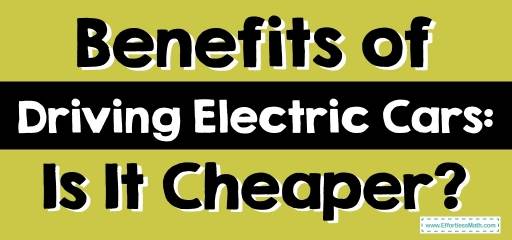Benefits of Driving Electric Cars: Is It Cheaper?

Electric vehicles are becoming mainstream, and the crowd of EV enthusiasts is getting larger as well. They praise the virtues of having an EV, its cheaper fuel, and maintenance as EVs do not need any oil change. It is cheaper to charge, run and maintain, which means it is economical to own as well.
On the contrary, the skeptics state their doubts about the efficiency and affordability of EVs with the premium prices of some electric vehicles. The debate goes on about the benefits of owning an EV. Is it economical to own and drive an electric vehicle in the long haul? Let’s find out.
The simple rule of comparison is that the per-mile cost of running an electric vehicle should be around a third of an ICE (internal combustion engine). Though, it is a simplified rule for the rough estimation.
The price one pays consists of hard-earned money and savings, the choice of vehicle to spend the saving on must be well-researched and calculated. The cost of buying and driving an EV depends on the choice and model of vehicle, the electricity cost in the local area, and a number of other factors.
Efficiency comparison
The efficiency of electric vehicles varies from model to model, the same as with fossil-fueled vehicles. The efficiency and cost of driving a larger and higher-performance vehicle cost more per mile than a smaller vehicle.
But with EVs, the efficiency level is quite different among different brands. For example, the Tesla Model X (2019) consumes 35 kilowatt-hours of electric charge to travel 100 miles.
In comparison, the Jaguar I-Pace (2019) uses 44 kilowatts-hour for a 100-mile trip, and the Audi e-Tron (2019) uses 46 kWh/100.
According to these calculations, Tesla is more energy efficient. Unsurprisingly 2020 Tesla Model Y Long Range AWD is even more efficient and economical than the previous larger Model X, with a capacity of 28 kWh/100 miles. Tesla Model Y, if compared to the EVs of other brands, is astonishingly efficient.
The Chevy Bolt EV has a range of 28 kWh/100 miles and Nissan LEAF runs 30 kWh/100. These are some fine and efficient vehicles, but the Tesla Model Y beats them in efficiency as it is significantly larger and well-equipped. In this way Tesla is arguably providing better delivery, efficiency, and cost-effectiveness, counterbalancing its high pricing.
The cost of electricity in the customer’s local area, where the customer is going to live and drive, is an important factor to determine the cost of driving.
US Energy Information Administration disclosed the average residential price of electricity in the US as of June 2020 was 13.28 cents per kilowatt-hour.
The regional price of electricity varies from state to state; in Louisiana 9.5 cents, in Washington, 9.92 cents, and in Alaska costs 23.85 cents per kilowatt-hour. The decision of buying and drive an electric car heavily depends on where you live and on the price of electricity in the local area.
Calculating the cost of charging an EV is not quite simple. Some regions offer time-of-use pricing, which means low pricing for charging during off-peak times. The EV users who live in these areas get more decrease in their driving costs. These were some important factors to consider calculating the cost for those who charge their EV at home.
But those drivers who need to travel for long distances must depend on DC fast charging to support their long trips. The DC fast charging is not cheap and can get expensive. But it is still less expensive than gas.
Tesla offered the early Tesla EV owners free supercharging, it can help save a lot on fill-ups while on the road for a long trip.
Comparison of electricity and gas prices
The comparison of prices of electricity and gas also depends on the local cost of fossil fuel. Without taking it into account a fair comparison is not possible.
As reported by the American automobile association (AAA), the current average price of gas is $2.22 per gallon. Just like the price of electricity, the price of gas also varies within the country. It is as low as $1.88 in Mississippi and as high as $3.24 in California.
It is observed that the prices of electricity and gas go in parallel, where the price of gas is high the price of electricity will also be high. Although it is not always the case.
Washington supports lower electricity prices despite the high price of gas. That makes Washington an ideal place to drive an EV.
Comparative stability in electricity prices is a positive for EVs, as gas prices often fluctuate in response to any natural or accidental disaster.
So, after considering several factors, the gist is simple electric vehicles are cheaper to drive as compared to fossil-fuel vehicles.
Related to This Article
More math articles
- Word Problems of Converting Percent, Fractions, and Decimals
- Standard Form of a Circle
- How to Multiply a Polynomial and a Monomial? (+FREE Worksheet!)
- 3rd Grade MAP Math FREE Sample Practice Questions
- How to Identify the Value of a Digit on Numbers Up to a Billion
- Using Strip Models to Explain Percent
- 3rd Grade NSCAS Math Worksheets: FREE & Printable
- Solve Equations
- Top 10 Tips You MUST Know to Retake the CLEP College Algebra
- Full-Length PSAT Math Practice Test

















What people say about "Benefits of Driving Electric Cars: Is It Cheaper? - Effortless Math: We Help Students Learn to LOVE Mathematics"?
No one replied yet.